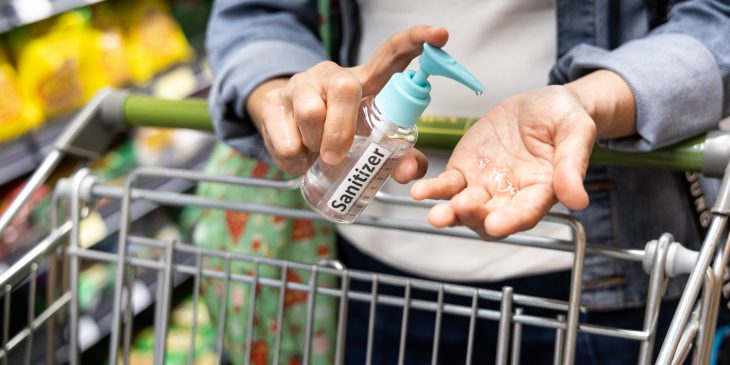Social distancing and staying home are known to prevent exposure to the novel coronavirus, COVID-19, but as social distancing orders are continuously extended, people find themselves in need of supplies. Grocery stores have remained open throughout the pandemic and it is important to protect ourselves when bringing new items into our homes.
Be sure to evaluate your own health before considering a trip to the store. If you have flu-like symptoms, including fever, cough and shortness of breath, do not go to the store. If you are elderly or have an underlying health condition, consider making alternative arrangements to restock supplies rather than shopping for yourself.
While at the grocery store, try to avoid touching any high-touch surfaces like door handles, handrails and touch screens at cash registers. Stay at least 6 feet away from other shoppers, including while in check-out lines. If you use a shopping cart, wipe it down with alcohol-based disinfectant wipes and avoid bringing reusable bags that cannot be easily disinfected. If you choose to wear gloves, be conscious about/avoid touching your face and eyes. Bring hand sanitizer or disinfectant wipes to maintain hand hygiene before, during and after the shopping trip.
“Use a tissue or your sleeve to cover your hand or finger if you must touch something,” said Sally Wenzel, M.D., chair of the Department of Environmental and Occupational Health at the University of Pittsburgh Graduate School of Public Health. “Consider carrying inexpensive sandwich size plastic bags to use as gloves in a pinch. Avoid touching your face after touching public surfaces, until you have been able to wash your hands or apply hand sanitizer.”
Once home, take measures to disinfect the items you purchased and make sure to wash your hands thoroughly after handling them.
“It is not certain how long the virus that causes COVID-19 survives on surfaces, but it seems to behave like other coronaviruses. Studies suggest that coronaviruses may persist on surfaces for several hours or up to days,” said Wenzel. “You might consider leaving your bag of groceries outside overnight to help decrease potential contamination. Wipe off all containers before you put them away with soap and water or alcohol-based wipes. Throw away the grocery bags and wash your hands again after you have put away the food.”
Wash produce with water — soap is not necessary as it is not safe for ingestion — and wipe down any counters that bags have been on with disinfectant.
Should you choose to bring home takeout, be sure to follow the same safety steps you would for groceries. Currently, it is widely accepted that COVID-19 is not transmitted by food, but food safety measures that are already in place to prevent foodborne illness — frequent handwashing, cleaning of surfaces and utensils and cooking food to the right temperature — should reduce any risk.
“Touching the packaging is the same as touching the surfaces of anything that could be contaminated. When you get home, dump the food onto your own dishes. Then throw out all bags and carry out containers. Don’t eat out of the restaurant containers,” stressed Wenzel. “Wash your hands as soon as possible after handling food packaging or takeout bags.”
For further information on maintaining a sterile home environment, consult the Centers for Disease Control and Prevention. Additional resources and education on COVID-19 can be found at upmc.com/coronavirus.









